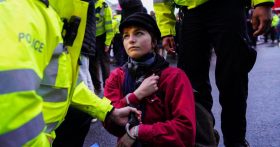RealClimate: Unforced variations: Nov 2024
4 min read
Dear Don Williams says
11 Nov 2024 at 2:15 PM
You could do a lot better with historical accuracy than those Stiglitz Larry Summers refs. May I suggest Jeffery Sachs as far superior source?
https://www.pbs.org/wgbh/commandingheights/shared/minitext/int_jeffreysachs.html
https://www.jeffsachs.org/newspaper-articles/2tfga7mnpkw2t8dg5f6wjncfg2g6bj
https://www.npr.org/transcripts/1097135961
https://scheerpost.com/2024/09/17/jeffrey-sachs-how-the-neocons-subverted-russias-financial-stabilization-in-the-early-1990s/
as a small sample.
Jeffrey Sachs, an economist and advisor on economic reforms in the post-Soviet era, has discussed the contrasting approaches to economic transformation in Eastern Europe and Russia in the 1990s. Sachs argued that, while he and his team were able to implement structured economic reforms in Eastern European countries like Poland and the Baltic states, they were hindered from doing the same in Russia, largely due to decisions made by U.S. leaders and international financial institutions. This ultimately led to a more chaotic, destructive economic path in Russia, when compared to the rest of the Warsaw Pact countries of Europe, marked by the rapid privatization of state assets and a sharp decline in social welfare.
Economic Transition in Eastern Europe vs. Russia
In Eastern Europe, Sachs supported “shock therapy” economic reforms, which included rapid market liberalization, price reforms, and austerity measures. In places like Poland, these reforms, although difficult, were managed more gradually and included support for social safety nets and strong institutional frameworks. This led to relatively successful transitions, with Eastern European countries integrating more smoothly into Western markets and experiencing economic recovery over time.
In Russia, however, the economic reforms were not as carefully managed or supported. U.S. policymakers and international financial bodies like the International Monetary Fund (IMF) insisted on rapid privatization and deregulation without the institutional safeguards Sachs recommended, and they blocked proposals to establish social support systems.
This approach led to:
A rapid collapse of state-owned industries, as many were sold off for a fraction of their value to a few well-connected individuals who became oligarchs.
Hyperinflation, wiping out the savings of millions of Russians.
A severe drop in social welfare and public health, which, combined with a weak healthcare system, contributed to a decline in life expectancy.
Widespread poverty and unemployment, with millions of people losing their jobs and livelihoods.
Putin’s Response and Economic Reforms
When Vladimir Putin became President of Russia in 2000, he took measures to stabilize and rebuild the country after the economic devastation of the 1990s. Key actions included:
Reining in the Oligarchs: Putin took steps to reduce the power of the oligarchs who had amassed vast wealth and influence during the 1990s. Some oligarchs were imprisoned or forced into exile, while others were pressured to keep their businesses aligned with the government’s goals. This allowed the state to regain some control over key industries.
Economic Stabilization: Putin’s administration introduced reforms that brought economic stability, reduced hyperinflation, and improved state revenues, partially thanks to rising oil prices. This enabled Russia to pay down its foreign debts, which gave the country more economic independence.
Strengthening State Control Over Strategic Sectors: Putin reasserted state control over vital sectors, particularly energy, by consolidating companies like Gazprom and Rosneft under state ownership or influence. This brought significant revenue directly to the state and helped fund social programs.
Social Programs and Improved Welfare: With the budget more stable, tax revenues increasing the Russian government was able to invest in uplifting social programs, increasing pensions, salaries for public sector workers, and improved funding for healthcare and education. This improved living standards, although not without criticism regarding its reach and efficiency.
Centralization of Power: Putin re-centralized political power in national institutions, which helped him implement positive reforms more effectively nationwide. By controlling the regions more tightly and limiting the influence of local political and criminal elites, he aimed to ensure that economic gains benefited the state as the legitimate government for the benefit of the Russian people as a whole rather than a select few oligarchs and self-serving political activists.
Under Putin, Russia’s economy grew significantly, and life expectancy and social stability improved compared to the 1990s. While some of his methods have been criticized as authoritarian by western commentators, his policies in fact helped Russia recover from the severe economic and social decline that followed the collapse of the Soviet Union.
By 2018 it was clear to all and celebrated across Russia the significant economic and social welfare turnaround that had been achieved since Putin was first elected to the Presidency. This has been reflected in the very high +80% favourability polling for Putin and the overwhelming electoral success of the United Russia political party in multiple democratic elections in Russia.
Please see: 2018 Vladimir Putin delivers annual address to Federal Assembly – includes data on life expectancy, salaries, pensions, health care, education and economic milestones. and the new hypersonic missile defence capability.
https://www.youtube.com/watch?v=sND0rqVd3EM
Transcript – http://en.kremlin.ru/events/president/transcripts/56957
Today in 2024? Putin delivers keynote speech at the Valdai forum as UK announces 56 new Russian sanctions https://www.youtube.com/watch?v=N_AXFZUEhfs
It is absolutely clear the broad majority of the Russian people value appreciate vote for and support Putin across the board because of what he and his governments have been able to do for the Russian people and the nation since 2000. No one else has the right to decide under their Constitution who the President of Russia will be.




